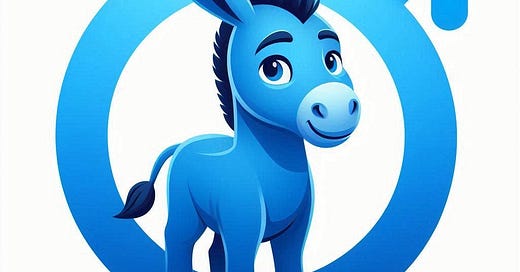Bro-whispering back
To win young men, Democrats first must admit they have a problem. Kamala Harris can be the answer.
John Della Volpe, who leads the Harvard Youth Poll, has a New York Times op-ed out this morning digging into the data on the emerging gender gap. It’s a good piece, and you should check it out.
But while Della Volpe does a great analysis of the “pull” factors drawing men toward Republicans, he doesn’t talk about the “push” factors driving them away from Democrats.
Here’s an excerpt:
Mr. Trump has tapped these anxieties by weaving a hypermasculine message of strength and defiance into his broader narrative that undermines confidence in democratic institutions. And it’s working. Aware that boasting about “killing” Roe v. Wade drove away young women, Mr. Trump zeroed in on capturing a larger share of the young male vote. In four years, he cut what was once a 19-percentage point Democratic margin among registered young male voters (50 percent Mr. Biden, 31 percent Mr. Trump) roughly in half (48 percent Ms. Harris, 38 percent Mr. Trump) in our poll.
His playbook? A master class in bro-whispering: championing crypto, securing the endorsement of Dave Portnoy — the unapologetically offensive founder of Barstool Sports — and giving U.F.C. President Dana White, who embodies the alpha-male archetype that appeals to many young men, a prime spot at the Republican National Convention. Mr. Trump has also cultivated relationships with simpatico comedians, pranksters, influencers and Silicon Valley billionaires like Elon Musk — all while his team bombards podcasts and social media with misinformation and memes to rally his troops.
This shift in support for Mr. Trump among men is neither organic nor unexpected. It’s what happens when a well-coordinated political operation invests tens of millions of dollars to amplify Mr. Trump’s narrative and weaken confidence in the party in power. Compared with when Mr. Trump ran in 2020, young male voters are now less likely to support government-backed climate change solutions (down 15 points, according to our poll) and affirmative action for qualified candidates (down eight points). They are more likely to question immigration policy (up 12 points), free trade (up 10 points) and whether government stimulus leads to economic growth (up seven points). They are also more likely to believe that religious values should play a more important role in government (up six points).
Della Volpe argues that shifts in men’s views on climate change, affirmative action, immigration, economics, and religion are downstream of the movement toward the Republican Party. Studies show that voters who change their partisan affiliation often shift their views and identities to match their new party's. But voters also change their party to match their pre-existing ideological beliefs better. For example, conservative-leaning nonwhite voters in America and Britain are increasingly abandoning Democrats and Labour in favor of Republicans and the Tories.
Another Playbook
There are places to reverse that trend. As
showed in How to win men's votes without backing down on women's rights, the gender gap is not just about gender issues. Men view many issues differently, affording pickup opportunities on issues ranging from cancel culture to nuclear without conceding core progressive issues:gender gaps in opinion aren’t necessarily driven by gaps in opinions about sex and gender. Across a broad swathe of policy questions, ranging from nuclear energy to the death penalty, men and women have, on average, different opinions. Which means that if you want to try to get male votes without compromising on progressive commitments to gender equality, you can probably pull that off by taking positions men tend to agree with on other issues.
James Carville put things crudely earlier this year in a much-discussed interview with New York Times columnist Maureen Dowd:
“A suspicion of mine is that there are too many preachy females … ‘Don’t drink beer, don’t watch football, don’t eat hamburgers, this is not good for you,'” he said. “The message is too feminine: ‘Everything you’re doing is destroying the planet. You’ve got to eat your peas.'”
The offensive nature of that section obscured Carville’s larger point that, too often, Democratic politicians and strategists seem to discount male voters entirely, preferring to focus on how other demographic groups might impact the election:
“If you listen to Democratic elites — NPR is my go-to place for that — the whole talk is about how women, and women of color, are going to decide this election. I’m like: ‘Well, 48 percent of the people that vote are males. Do you mind if they have some consideration?” Carville said.
When Democrats do try to appeal to men, they face blowback from their left flank. Consider the griping over Kamala Harris telling Oprah that she owns a Glock and that, if someone broke into her home, “they’re gonna get shot.” Read articles like this one in The Nation, arguing that Democrats embracing Tim Walz’s background as a football coach represents “hypermasculinity and violence” that could “repel young voters.” (Yes, that is a real, non-satirical article.)
When people float that Harris should go on the Joe Rogan Experience — the most popular podcast in the world, with a large audience of young men — the response often goes like this:
Can you imagine if someone said the same thing about Harris going on Call Her Daddy, The Shade Room, or The Breakfast Club?
Authenticity Required
Too often, Democratic attempts to appeal to men come off as inauthentic. Just look at a recent video Dave Bautista filmed where he poked fun at Trump’s masculinity. He’s trying too hard to come off as a tough guy, making the whole effort feel like too-obvious pandering.
A better way forward is what Ruben Gallego did: hosting a watch party for the Canelo-Munguía boxing match. Gallego doesn’t need to prove that he’s a tough guy; he’s a combat veteran. He talks about how he’s followed boxing since he was a kid.
Harris should continue leaning into her own authentically compelling story to young men. Pitch the many undecided men who listen to the Joe Rogan Experience, who may find her willingness to use a Glock on an intruder compelling. It is authentic - and a direct rebuttal to those on the litmus test left who derailed her 2020 campaign, and helped lead many men in the middle towards the GOP.
There’s no secret formula for appealing to men. But a good start would be to admit Democrats pushed away young men in the first place.
Milan Singh founded the Yale Youth Poll and has written about how most young voters aren’t liberal.







This is an interesting subject area and it is good to see Milan's take on it as a younger man.
On some of the campaigns I've worked on there was a sort of sense of shame because they had a disproportionately male base of supporters. It seems like a live questions for some Democrats if men have legitimate "men's issues" and if they should even try to make class-based appeals. Sometimes they seem to settle on a sort of bank-shot approach.
In many ways it feels like Democrats have policies that would benefit men but don't take/get the credit for them. Most people in prison or killed by police are men and Democrats are the ones pushing for reform there but it isn't often framed as a gender issue and it isn't clear that going so would help them.
I sort of found Matt's framing of "How to win men's votes without backing down on women's rights" a bit strange because it isn't really clear how, if you were willing, you could back down on women's rights to win men's votes.
When I spoke to voters there was a sense that Democrats sort of just didn't like men that much. I even heard similar feelings from mothers with young sons who said they felt that way.
Obviously feelings on the Dave Bautista video are quite subjective but I do wonder to what extent highlighting and discussing "masculinity" are useful for Democrats. It seems like it could just come off as more "policing" from people who talk about masculinity in terms of "toxic" or "fragile".